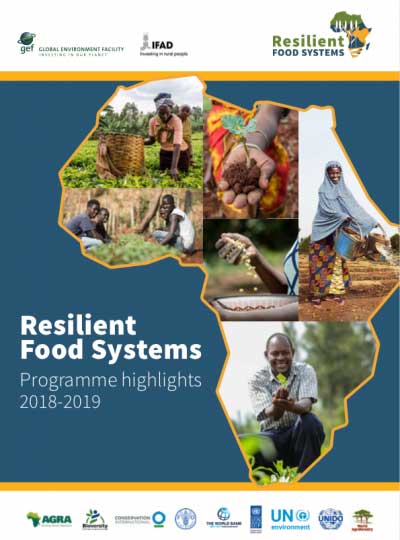March 2020. Over the past two years, the Resilient Food Systems (RFS) programme, one of the three Integrated Approach Pilots funded by the Global Environment Facility (GEF), has been committed to fostering sustainability and resilience for food security in sub-Saharan Africa.
The five-year programme (2017 - 2022) is committed to fostering sustainability and resilience for food security in sub-Saharan Africa, contributing to a paradigm shift in the continent’s agriculture: one which emphasises the importance of natural capital and ecosystem services to enhance agricultural productivity.
The Global Environment Facility (GEF) led the programme design and has provided its core grant financing ($116 million), along with strategic guidance. It’s a multi-agency programme funded by GEF and led by IFAD. Various actors like World Bank, UNDP, UNEP, UNIDO, FAO, ICRAF, Conservation International, Bioversity International and AGRA are all partners of this programme at the regional and country levels.
The programme consists of 12 country projects – Burkina Faso, Burundi, Ethiopia, Ghana, Kenya, Malawi, Niger, Nigeria, Senegal, Swaziland, Tanzania and Uganda – each contributing to a paradigm shift in the continent’s agriculture: one which emphasises the importance of natural capital and ecosystem services to enhance agricultural productivity.
The Annual Report covers implementation of the RFS programme between 2018 and 2019, providing an overview of the activities, achievements, lessons learned, and best practices of the 12 country projects and the RFS Regional Hub. The report captures and highlights the considerable learning and knowledge that has been generated and shared by the implementing agencies, partners and beneficiaries within each country project. It serves as an acknowledgement of the significant achievements made possible by the collective efforts of all RFS partners.
The five-year programme (2017 - 2022) is committed to fostering sustainability and resilience for food security in sub-Saharan Africa, contributing to a paradigm shift in the continent’s agriculture: one which emphasises the importance of natural capital and ecosystem services to enhance agricultural productivity.
The Global Environment Facility (GEF) led the programme design and has provided its core grant financing ($116 million), along with strategic guidance. It’s a multi-agency programme funded by GEF and led by IFAD. Various actors like World Bank, UNDP, UNEP, UNIDO, FAO, ICRAF, Conservation International, Bioversity International and AGRA are all partners of this programme at the regional and country levels.
The programme consists of 12 country projects – Burkina Faso, Burundi, Ethiopia, Ghana, Kenya, Malawi, Niger, Nigeria, Senegal, Swaziland, Tanzania and Uganda – each contributing to a paradigm shift in the continent’s agriculture: one which emphasises the importance of natural capital and ecosystem services to enhance agricultural productivity.
The Annual Report covers implementation of the RFS programme between 2018 and 2019, providing an overview of the activities, achievements, lessons learned, and best practices of the 12 country projects and the RFS Regional Hub. The report captures and highlights the considerable learning and knowledge that has been generated and shared by the implementing agencies, partners and beneficiaries within each country project. It serves as an acknowledgement of the significant achievements made possible by the collective efforts of all RFS partners.


No comments:
Post a Comment